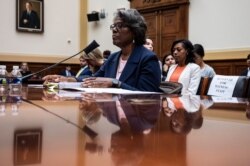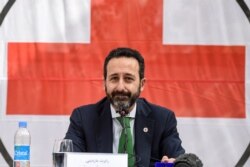Providers of humanitarian aid called on the U.N. Security Council Friday to support their work to reach millions in need, as they and their operations increasingly become targets of violence and attacks.
“One hundred-ninety-one humanitarian workers have been killed, injured or kidnapped since the beginning of this year. Many of them are national workers who are more exposed to risks, as they are intervening on the frontlines,” Lucile Grosjean, Advocacy Director for the international NGO Action Against Hunger told the council. “Our appeal is clear: the Security Council must move to act and put an end to this deadly spiral.”
The attacks are increasingly widespread.
In Tigray, Ethiopia, which is on the brink of famine, three staffers from medical charity Médecins Sans Frontières were ambushed and murdered earlier this month. In June, workers with the demining organization HALO Trust were attacked in Afghanistan, 10 were killed and 16 injured. A few days later, five health workers vaccinating an Afghan community against polio were killed. In South Sudan, considered one of the most dangerous places for aid workers, four were killed in June.
And the list goes on. Schools and hospitals are not spared.
“The World Health Organization (WHO) has recorded 568 incidents affecting the delivery of medical care in 14 conflict zones so far in 2021 — this has caused 114 deaths of healthcare workers and patients,” U.N. Deputy Secretary-General Amina Mohammed told the council. “These attacks include shootings, shellings, threats, the removal of equipment and the militarization of medical facilities.”
“Humanitarian workers are the world’s superheroes,” U.S. Ambassador Linda Thomas-Greenfield said. “They go into war zones unarmed. They do not support any side to any conflict. They voluntarily risk life and limb purely to save lives and alleviate suffering.”
She urged nations and parties to conflicts to implement their obligations under international humanitarian law and protect the independence and neutrality of aid organizations.
“It is time to give aid workers the protection and the security they deserve, so that they can do the world’s most important work,” she said.
U.N. Secretary-General Antonio Guterres has decided to appoint a special adviser on the preservation of humanitarian space and access in a bid to improve the situation.
Aid workers are protected by the Geneva Conventions and international humanitarian law. The principles of humanity, neutrality, impartiality and independence guide their work.
“Attacks on humanitarian workers are completely unacceptable and may constitute war crimes,” the deputy secretary-general said. “They should be investigated and prosecuted accordingly. What goes unpunished will be repeated.”
Host country governments and parties to conflicts are expected not to target humanitarian workers, yet they face growing threats, intimidation, harassment, kidnappings, sexual assaults and death. All of which have complicated aid distribution at a time when the United Nations is trying to reach a record 160 million people in need this year.
International Committee of the Red Cross Director-General Robert Mardini requested the Security Council help ensure aid organizations are able to work in close proximity to the people they are trying to assist; to make good on verbal commitments to international humanitarian law; and, to lessen the impact of counter-terrorism measures, including in council resolutions, by establishing properly designed humanitarian exemptions.
“Decisive, bold action in these three areas would demonstrate much-needed political will to protect and serve the people who need humanitarian action and those who provide it,” Mardini said. “And it would help turn words about our commitment to humanity into meaningful deeds.”













